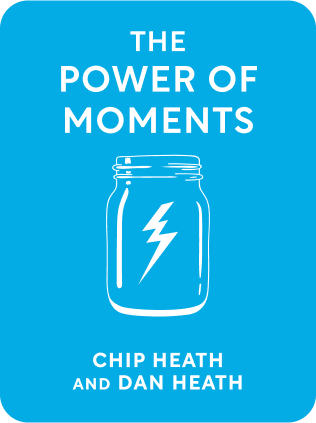

This article is an excerpt from the Shortform book guide to "The Power of Moments" by Chip Heath and Dan Heath. Shortform has the world's best summaries and analyses of books you should be reading.
Like this article? Sign up for a free trial here .
What is a peak experience? Can you think of a particularly memorable experience from your past? What made it a “peak experience”?
Peak experiences transcend everyday patterns and impart positive feelings like delight, motivation, and engagement. Some of these positive peaks naturally occur in everyday life but they don’t have to be spontaneous. According to Chip and Dan Heath, the authors of The Power of Moments, you can engineer these experiences through what they call “elevation.”
Here, Chip and Dan Heath explain the psychology behind peak experiences.
How to Elevate Everyday Moments
The book The Power of Moments explains the psychology of peak experiences well. According to the Heaths, peak experiences are elevated moments that you look back on fondly. Some of these positive peaks are naturally occurring in social moments like weddings and graduations, performance moments like playing in a big game or giving a talk in your field of expertise, and spontaneous moments like an unexpected upgrade on your flight. However, most experiences don’t have natural positive peaks—but you can add positive peaks to them by choosing one or two moments to elevate thoughtfully.
While elevating certain moments will take a bit of extra effort, they’re worth the trouble—their absence, an endless routine lacking “peakiness,” leads to boredom and disengagement.
- Think of a dull relationship that stretches on for years. Everything’s fine, but nothing new ever happens. Eventually, you both mentally check out and decide to call it quits. Or, you spend years working in a job where every week feels exactly the same—it feels soul-sucking, and you start looking for work elsewhere.
Using elevation to produce novel, memorable events is key to creating experiences that foster positive feelings and increase engagement. The Heaths identify three ways to use elevation: increase sensory pleasure, raise the stakes, and go off script with strategic surprise. Successful, memorable moments incorporate at least two of these methods.
Method 1: Increase Sensory Pleasure
The first way the Heaths suggest elevating a moment is with increased sensory pleasure—that is, making a moment look, feel, taste, or sound better than what you’re used to.
- For instance, getting dressed up to go out to a fancy restaurant looks, feels, and tastes different from eating in your sweatpants on the couch.
Sensory differences make memories stick. This is because a sensory upgrade is a type of novelty—it forces the brain to re-engage, process more information, and make the experience richer and more memorable.
The authors note that upping the sensory appeal of a moment doesn’t need to be expensive or extravagant—it can be as simple as a team leader conducting her employees’ year-end meetings in a park instead of in her office, or a rabbi delivering the Torah to a synagogue member’s home during the COVID-19 pandemic so that his bar mitzvah would physically feel special, even if it needed to be done by video.
| Which Senses Should You Elevate? The Heaths don’t discuss which sensory appeals work best, but numerous studies have concluded that memory links most strongly to your sense of smell. You can use this information to engineer small, special moments in a variety of contexts. For example: You wear a certain “date night” perfume or cologne to make outings with your partner feel more special—and, each time you smell it, you’ll recall memories of past outings. You bake a certain type of cookie every Friday afternoon with your kids to celebrate the coming weekend. The moment stands out against the rest of the week, and your kids will recall it every time they smell that type of cookie in the future. Many organizations invest a lot of money in scent branding to evoke certain emotions in their clients, make clients feel that their products are high-quality, and ensure that their clients recall their brand whenever they encounter a certain scent. |
Method 2: Heighten the Stakes
The second way to elevate a moment is to raise the stakes. The Heaths explain that adding high stakes to a situation makes an otherwise flat, unengaging experience into a standout, exciting experience—for instance when you look back at your high school career, you’ll more likely remember your debate team championship than your algebra classes.
(Shortform note: One reason that high-stakes experiences stand out in your memory may be that the prospect of a high reward forces your brain to use long-term memory to “help out” your short-term working memory. As a result, your attention is more fully focused on the event—your brain re-engages in order to process all the information you’re taking in.)
| Raising the Stakes Effectively Raising the stakes can seem like the same thing as increasing stress, but this line of thinking is a mistake. Stress not only has a strong negative impact on memory recall, but it’s also usually not particularly meaningful. High-stakes situations that aren’t enjoyable or rewarding in any way cause stress. For example, assigning your students an oral presentation that counts for 50% of their grade raises the stakes of an assignment by adding stress. The students won’t look back on the experience as a positive one—among the other stresses of their academic careers, it likely won’t stand out at all. To raise the stakes effectively, focus on increasing productive pressure: Pressure that’s interesting or fun in some way. Most experiences during students’ academic careers are focused on grades—productive pressure shifts the focus in a novel direction, toward fun. Rather than blending into the everyday stress of school, a fun experience stands out in students’ memories for years to come. Let’s reimagine the oral presentation: You have each of your students choose a personal hero to interview. Instead of having each student give their presentation in the classroom like regular presentations, you organize a “Hero Day” in the auditorium. Each student’s interview subject is invited to come to the special event where they’ll listen to the speeches and mingle at an afterparty. Hero Day adds productive pressure to the presentation—with the added pressure of having their heroes listening in on their work, the students feel excitement in putting together a presentation that best represents someone they look up to. |
Method 3: Go Off Script
The last method of elevating a moment is going off script, which the Heaths define as acting in a way that goes against what people expect. Of the three methods of elevation, going off script takes the most effort but is usually the most worthwhile: Recall our discussion of the “reminiscence bump”—the most memorable times of your life are due to going off script, encountering something unexpected and new as a result.
The idea that going off script takes extra effort may be confusing at first glance. It doesn’t seem so hard to come up with the occasional novel experience or fun surprise every now and then. The problem with this thinking is the assumption that you can meaningfully elevate an experience with cheap, easy surprises.
- For example, you bring cupcakes to your weekly HR team meeting on improving employee experience. It’s a nice gesture, but the surprise won’t be memorable or meaningful as long as the rest of the meeting unfolds the same exact way it always does.
Going off script in a way that’s meaningful and memorable requires strategic surprises.
(Shortform note: Cheap, easy surprises are almost-predictable events—having a snack at a meeting is overall, an unremarkable event. In contrast, strategic surprises are surprises that break behavioral patterns in a way that challenges assumptions about what comes next and draws the audience in.)
Why You Avoid Novel Experiences—And Why You Should Lean Into Them
As much as going off script can benefit you, it’s human nature to gravitate toward the comfort of familiar scripts. It’s harder to start taking the family rock climbing every Saturday than it is to sleep in and watch cartoons.
| We avoid novelty because of the familiarity bias—familiar situations feel less threatening than new ones. Numerous psychologists have looked into this phenomenon: In 1991, a study by Chip Heath and Amos Tversky found that when given a choice between two gambles, people are more likely to choose the one that’s more familiar to them—even if their odds of winning are lower. In his book Thinking, Fast and Slow, psychologist Dan Kahneman discusses the mere exposure effect: The more contact we have with something, the more we like it. Despite our preference for familiarity, novelty is often the better choice because it multiplies your memorable experiences, helps you develop new perspectives, and expands your problem-solving skills. Furthermore, it helps you learn risk tolerance—which is vital to meaningful moments defined by insight, as we’ll see in the following chapter. If you find yourself resisting novel experiences, think of it this way: Of all ways you could learn about confronting risk, moments of delight are the most enjoyable ways to do so. |
Why Elevation Is Especially Hard to Pull Off
The Heaths note that many people balk at the idea of creating moments defined by elevation because they require thoughtful effort—no one wants to take on the extra work they require. People often talk themselves out of making the effort for two reasons:
1) The Moment Isn’t Urgent
Because elevation is fun and doesn’t feel especially urgent, it’s easy to let tasks that feel more urgent or important—such as meetings or grading a pile of unmarked essays—take precedence over the work of creating a defining moment.
2) The Moment Seems Too Complicated
Practicality has the power to bring a great idea’s “peak potential” down to a very unremarkable bump. Elevated moments are often more logistically complicated than business as usual, so it’s all too easy to wave them off as unreasonable and offer up an easier (but less delightful) experience in their place.
The Heaths suggest ignoring practicality in favor of putting effort into delightful ideas. Otherwise, the experience you imagine will be replaced by the least logistically complicated option.
- Imagine if the owner of the airport hotel decided that he didn’t want to shell out the money to surprise guests with their favorite drinks. It would have been easy to scrap that idea and simply offer free sodas in the room’s mini-fridge. As practical as the second option is, it wouldn’t have created a positive peak in guests’ minds and certainly wouldn’t prompt them to write rave reviews.
We can all think of places in our lives where we have let practicality win. You and your friend have been thinking about a road trip for ages, but it just seems like too much work. You have to plan the route, rent a car, take time off work, plan your budget…you decide it would be more practical to meet for coffee every weekend like you always do. By reaching for the least logistically complicated option, you miss out on the trip of a lifetime, rich with defining moments.

———End of Preview———
Like what you just read? Read the rest of the world's best book summary and analysis of Chip Heath and Dan Heath's "The Power of Moments" at Shortform .
Here's what you'll find in our full The Power of Moments summary :
- How to make everyday experiences meaningful and memorable
- A look at the four elements that create meaning
- How your senses can play a role in elevating everyday moments






